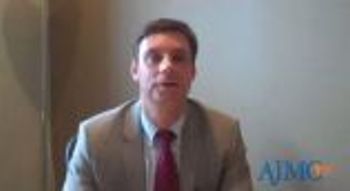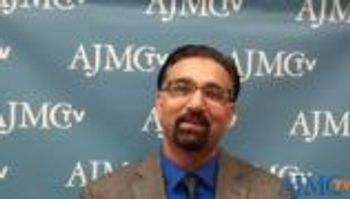
In this video, Daniel George, MD, Director, Prostate Clinic, Genitourinary Oncology, Duke Cancer Institute, shares his thoughts on the most exciting data to be presented on immunotherapies at the ASCO Annual Meeting 2013.

In this video, Daniel George, MD, Director, Prostate Clinic, Genitourinary Oncology, Duke Cancer Institute, shares his thoughts on the most exciting data to be presented on immunotherapies at the ASCO Annual Meeting 2013.

Although medication safety in hospitals has improved in the past decade, substantial issues persist. This presentation by representatives of the Institute for Safe Medication Practices (ISMP) reviewed the top 10 issues and presented strategies for improving outcomes.

Clostridium difficile infection (CDI) is a common hospital-acquired infection that is associated with a high clinical and economic burden. Because of this management of CDI is quickly becoming a part of institutional quality measures.

An ongoing phase I study of patients who have experienced relapsed and/or refractory multiple myeloma has found that this population was largely able to tolerate a new oral 20S proteasome inhibitor after receiving other prior treatments.

This finding makes it clear that patients should be advised that they need to achieve a certain fitness level, and not just be told that they need to exercise. Unlike patient-reported exercise behavior, Lakoski said, fitness can be objectively and accurately measured in a clinical setting.

Half the patients with relapsed or refractory chronic lymphocytic leukemia (CLL) who were treated with idelalisib in a phase I study experienced rapid and prolonged tumor shrinkage, a promising finding given the limited treatment choices for this group.

Results detailed today offer hope that a new form of immunotherapy will propel the bodies of some cancer patients to fight tumors, not be overrun by them, according to a study outlined at the Annual Meeting of the American Society of Clinical Oncologists (ASCO) in Chicago.

Patients in a phase III trial lived longer and experienced fewer treatment-related deaths from locally advanced non-small cell lung cancer (NSCLC) after receiving the standard dose of radiotherapy, compared to those receiving a high dose, according to a study presented today at the Annual Meeting of the American Society of Clinical Oncologists (ASCO).

Imaging spotted relapses for just a tiny fraction of patients with diffuse large B-cell lymphoma (DLBCL) before symptoms appeared, according to a new multi-institutional study, prompting recommendations that the radiation exposure of follow-up scans may not be worthwhile for all patients.

Highlights from The Academy of Managed Care Pharmacy's 25th Meeting & Expo, which took place on April 2“5, 2013, in San Diego, CA, are available in a newsletter published by The American Journal of Managed Care.

In "What Does the Affordable Care Act Actually Do?," presented by Ivor Douglas, MD, Associate Professor, University of Colorado Denver, Chief, Pulmonary Sciences and Critical Care Medicine Director, Medical Intensive Care, Denver Health Medical Center, at the ATS 2013 International Conference, Dr Douglas noted that fundamental issues driving the Affordable Care Act (ACA) include access, quality, and cost.

Richard Channick, MD, Director, Pulmonary Hypertension and Thromboendarterectomy Program, Massachusetts General Hospital, Boston, MA, spoke at the 2013 American Thoracic Society International Conference as part of a session featuring the Clinical Trials in Pulmonary Hypertension.

In this video, Richard Channick, MD, Director, Pulmonary Hypertension and Thromboendarterectomy Program, Massachusetts General Hospital, Boston, MA, speaks about the use of Macitentan for the treatment of pulmonary arterial hypertension (PAH).

Colin Cooke, MD, MSc, Assistant Professor of Medicine, University of Michigan, Ann Arbor, MI, says that hospitals with higher readmission rates that treat patients with acute myocardial infarction, congestive heart failure, and pneumonia will be penalized due to healthcare reform.

The panel at the American Thoracic Society 2013 International Conference continued discussions that suggested high rates of hospital readmissions may be an indicator of poor initial treatment, or failure to coordinate care. Further, these rates, which varied dramatically from hospital to hospital, were often excessively expensive.

Scott Halpern, MD, PhD, discussed the Choosing Wisely campaign with his opening presentation on The History of and Rationale for the Choosing Wisely Campaign. As most healthcare providers know, healthcare spending per capita in the United States is significantly higher than most other countries.

David Au, MD, Professor, Division of Pulmonary and Critical Care Medicine, University of Washington, Seattle, WA, says that hospital systems represent only one aspect of care delivery for patients who have been hospitalized.

In this video, Gulshan Sharma, MD, MPH, Associate Professor, University of Texas Medical Branch, Galveston, TX, addresses the hospitalist movement, which has resulted in shorter hospital stays and lower costs of care.

David H. Au, MD, MS, kicked off the Hospital Readmissions session at the American Thoracic Society 2013 conference with his presentation on Defining the Role of the Practitioner, Scientist and Policymaker. In the presentation, Dr Au says that it is important for all stakeholders in the healthcare industry to focus on hospital readmission rates.

Dr Keertan Dheda's presentation at the American Thoratic Society 2013 International Conference, XDR TB: What Else Can We Do? focused on the growing epidemic of drug resistant tuberculosis (DR TB). Dr Dheda said there are about 25000 XDR TB global cases annually, and that DR TB can be very expensive to treat and manage.

"I think probably most importantly, the Affordable Care Act (ACA) seeks to expand insurance coverage for a large population of people," said Colin Cooke, MD, MSc, Assistant Professor of Medicine, University of Michigan, Ann Arbor, MI.

David Weidig, MD, System Director of Hospital Medicine, Aurora Medical Group, Milwaukee, WI, says that readmissions are not necessarily a failure of medical treatment, but a failure of psycologic and social support systems for the patient that are not addressed while the patient is hospitalized.

The session opened up with a discussion of the emerging field of renal denervation therapies as presented by Juan F. Granada, MD, a cardiologist at the Skirball Center for Cardiovascular Research in New York.

One of the most important aspects of a successful catheterization involves decision of access entry point. Several presentations covered case studies with different entry points.

One of the most talked about subjects at the SCAI 2013 meeting was the Appropriate Use Criteria (AUC). There are great economic and potential implications associated with the designations of appropriate or inappropriate for specific diagnostic procedures and treatments.

Manesh Patel, MD, an interventional cardiologist at Duke University began by presenting a talk entitled, Appropriate Use Criteria: The Reasons, Methods, Intended, and Unintended Consequences. He first pointed out that Medicare expenditures on imaging have doubled between 2000 and 2006.

This session was perfect for the SCAI conference. Two opposing investigators were pitted against each other to debate 2 distinctly different treatment modalities. At the end of the debate, the physicians in the audience voted in live time in favor of 1 of the 2 treatments.

Dramatic changes in medical payment and economics began with the passage of the Affordable Care Act in 2010. Cardiologists weighed in on how this law is expected to impact upon their treatment decisions and business economics.

Sudden cardiovascular events are often preceded by embolus. The latest technologies for detection of emboli were showcased in a presentation by Emannouil S. Brilakis, MD, PhD, of the University of Texas, Southwestern Medical Center. Dr Brilakis presented Intra-coronary Infrared Spectroscopy to Predict Embolization Risk During PCI.

In the multi-part presentation entitled The Quality Mandate: Understanding New Regulatory Policies and Quality Superheroes, Robert Yeh, MD, a cardiologist at Massachusetts General Hospital (MGH), started the first session by reporting on the changing epidemiology of today's cardiovascular disease patient.

259 Prospect Plains Rd, Bldg H
Cranbury, NJ 08512
© 2025 MJH Life Sciences®
All rights reserved.
